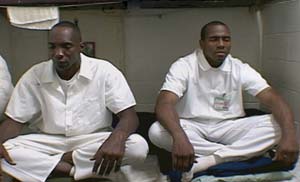 The Donaldson Correctional Facility in Bessemer, Alabama holds 1500 of the country’s most violent offenders. Inmates there have been convicted of murder in every degree among other senseless acts of extreme violence that will haunt the victims’ (and the inmates’) families for years. Donaldson houses it all.
The Donaldson Correctional Facility in Bessemer, Alabama holds 1500 of the country’s most violent offenders. Inmates there have been convicted of murder in every degree among other senseless acts of extreme violence that will haunt the victims’ (and the inmates’) families for years. Donaldson houses it all.
Besides wondering myself whether such criminals can ever be rehabilitated, the fiscal conservative in me asks whether that’s even the taxpayer’s job to fund. My answer to either question probably depends on whether I’m in an Old Testament eye-for-an-eye mood or leaning more New Testament-y and willing to try and love my (incarcerated) neighbor as myself.
Enter “The Dhamma Brothers,” a new documentary that hits select theaters this Friday, which takes a stab at that very question of whether people can ever really change their behavior. The film centers on a fascinating social experiment that took place at Donaldson in 2002 where inmates were given the chance to take a ten-day Vipassana meditation retreat, replete with total silence, within the confines of the prison. Just what happens to this group of prisoners when their minds start screaming louder than their mouths ever could?
What results is a film that will undoubtedly challenge many of your most cynical opinions of the criminal condition. We all know that old aphorism that says that a leopard can’t change his spots, but what if that leopard met the Buddha? Yes, the leopard may very well eat the Buddha, thus leaving the saying intact, but none of us really know, do we?
For the sake of understanding the movie’s title, the “Dhamma” are the teachings of the Buddha and the “Dhamma brothers” are a specific group of inmates who took the Director of Treatment up on his Vipassana experiment and who felt completely transformed for the experience after so many other rehabilitation attempts had failed .
Are any of these guys really changed by Vipassana, a word that literally means “to see things as they really are?” After watching this film, chock-full of fascinating personal interviews with the inmates, prison guards, warden, and a slew of other people instrumental in pulling together such a progressive program, you get to be the judge and jury as to its effectiveness.
I’m not saying that any of these once (and still?) violent offenders are at the top of my afternoon tea list or will be invited to my next Knife-Sharpening with Your Ex Who Ruined Your Life party, but I do have great empathy for each individual man behind the crime. If I truly believe that I am not the sum of my past actions (as I always yammer on about in my Oprah/Eckhart class commentaries here at Beliefnet), then I know that these men are much more than their past actions, too.
As for the meditation philosophies of the East trying to squeeze underneath the tight Bible belt of the Deep South, the filmmakers do a nice job of exploring reactions at the local and state level.
As one local woman says:
Well, I don’t believe in Buddhism or stuff like that…I’m a Christian…or any kind of witchcraft at all…so I don’t believe it would help.
Another townsman quips:
They should’ve meditated before they done whatever they did to get in there.
Both were so brilliant that I couldn’t help but transcribe them here.
I found “The Dhamma Brothers” to be fascinating, inspiring, complex and, ultimately, hopeful. In a perfect world it would be the subject matter for a brilliant reality television series that would allow the viewer to spend more time with these men to see the long-term effects of such a groundbreaking and innovative program.
Of course, in a truly perfect world, we wouldn’t have people committing violent crimes in the first place, I imagine.


